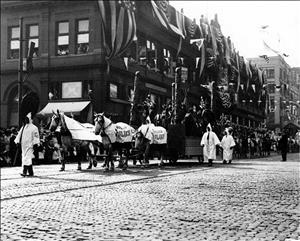On July 17, 1911, Seattle holds its first Golden Potlatch festival. The citywide celebration commemorates the 1897 arrival of the steamer Portland from Alaska loaded with gold from the Klondike River in Canada. Over the next five days, approximately 300,000 persons visit Seattle to attend parades, concerts, and demonstrations by "automobilists" and an aviator. Potlatch is a word (from Chinook Jargon patlac, originally from a Nootka word) describing a North Coast Native American ceremony (not as such part of the ceremonial repertoire of Puget Sound tribes) involving a celebration and gift giving.
The Golden Potlatch festival was organized by a carnival association of civic clubs hoping to continue the visibility of Seattle after the Alaska-Yukon-Pacific Exposition of 1909. U.S. Navy ships visited Seattle along with an airplane piloted by Lt. Eugene Ely, the first pilot to take off and land on a ship.
Other events included a race by automobiles up Queen Anne Hill along Taylor Avenue N, and a reenactment of the arrival of the Portland with costumed miners carrying replica sacks of gold.
Seattle's Potlatch continued only until the beginning of World War I in 1914. The festival was marred by rioting in 1913 when soldiers and sailors looted and burned the offices of the Industrial Workers of the World (IWW) and the Socialist Party. Potlatch was started again beginning in 1934, but was cancelled after 1941 because of World War II.

